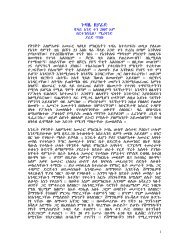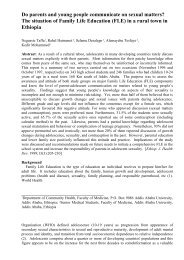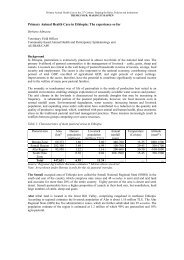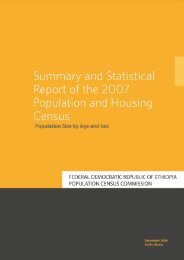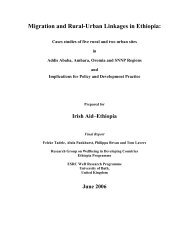The follow<strong>in</strong>g chapter will exam<strong>in</strong>e the context <strong>of</strong> women’s life <strong>and</strong> <strong>in</strong> the light <strong>of</strong> theabove objectives.3.6 Women’s Life Context <strong>in</strong> <strong>Ethiopia</strong>Though some clauses <strong>in</strong> the country’s 1960 Civil Code are discrim<strong>in</strong>atory <strong>and</strong> violate thepr<strong>in</strong>ciples <strong>of</strong> the 1994 <strong>Ethiopia</strong>n Constitution, there are a number <strong>of</strong> legal provisions thatbenefit women <strong>in</strong> significant ways. However, legal literacy is very low <strong>and</strong> most womenare unaware <strong>of</strong> their statutory rights. This is a key reason for the non-enforcement <strong>of</strong> laws<strong>in</strong> personal disputes. Provision <strong>of</strong> dispute resolution services is also limited.The Government has demonstrated its commitment to promot<strong>in</strong>g the equitable socioeconomicdevelopment <strong>of</strong> women by the establishment <strong>of</strong> the National Policy for Women<strong>in</strong> 1993 <strong>and</strong> its promulgation <strong>of</strong> the new Constitution <strong>in</strong> 1994 (Transitional Government <strong>of</strong><strong>Ethiopia</strong>, 1993). The aim <strong>of</strong> the National Policy for Women is to <strong>in</strong>stitutionalize thepolitical <strong>and</strong> socio-economic rights <strong>of</strong> women by creat<strong>in</strong>g appropriate structures <strong>in</strong>government <strong>in</strong>stitutions so that public policies <strong>and</strong> <strong>in</strong>terventions are gender-sensitive <strong>and</strong>geared towards ensur<strong>in</strong>g equitable development for all <strong>Ethiopia</strong>ns (FDRE, 1998b).The Women’s Affairs Office has been established under the Prime M<strong>in</strong>ister’s Office <strong>in</strong>order to design a strategy that would allow women to contribute to <strong>and</strong> benefit from thecountry’s on-go<strong>in</strong>g democratization, judicial reform <strong>and</strong> economic reconstructionprocesses. In the m<strong>in</strong>istries, commissions <strong>and</strong> other <strong>in</strong>stitutions <strong>of</strong> central government,women’s affairs departments (WAD) have been set up at the departmental level. Atregional level, implementation <strong>of</strong> gender-specific policies is promoted by the establishment<strong>of</strong> regional women’s affairs <strong>of</strong>fices (FDRE & UNICEF, 2001). The latest attempt to enhancewomen’s social position <strong>and</strong> opportunities is the Gender <strong>and</strong> Development Program <strong>of</strong>Action supported by UNICEF. Approved <strong>in</strong> August 2001, its ma<strong>in</strong> objective is to overcomeall k<strong>in</strong>ds <strong>of</strong> discrim<strong>in</strong>ation aga<strong>in</strong>st women <strong>and</strong> to establish their equality with men.The high prevalence <strong>of</strong> illiteracy among women makes it difficult for them toparticipate <strong>in</strong> society. The World Bank <strong>and</strong> the Government (1998) have noted therelatively low <strong>in</strong>volvement <strong>of</strong> women <strong>in</strong> development <strong>in</strong>terventions: Women are unable tobenefit equitably from exist<strong>in</strong>g opportunities because <strong>of</strong> their low social <strong>and</strong> economicstatus, as well as technical reasons, such as the lack <strong>of</strong> facilities or transportation. Also,women are not usually members <strong>of</strong> formal groups such as cooperatives <strong>and</strong> associations. Ifat all, they tend to belong to <strong>in</strong>formal <strong>and</strong> traditional groups. The customary laws <strong>and</strong>practices are patriarchal <strong>and</strong> h<strong>in</strong>der women’s access to resources both with<strong>in</strong> <strong>and</strong> outsidethe household. The same tendency can be noted also <strong>in</strong> the very low representation <strong>of</strong>women <strong>in</strong> the Parliament – 7.7 per cent, which is only slightly more than half the regionalaverage, 12.4 per cent (FDRE, 2001c).In general, <strong>Ethiopia</strong> is a country that has several traditional practices with potentialharmful effects to the health <strong>of</strong> a person. The NCTPE (1998) has made a list <strong>of</strong> 88 harmfultraditional practices (HTP) observed <strong>in</strong> the country. The list <strong>in</strong>cludes also some customswhere the harm cannot be demonstrated, but a majority <strong>of</strong> them can severely maim aperson. Among the HTPs related to women or female children are FGM, early marriage,27
marriage by abduction, isolation dur<strong>in</strong>g menstruation <strong>and</strong> delivery, not allow<strong>in</strong>g pregnantwomen to eat nutritious food, <strong>and</strong> sutur<strong>in</strong>g the vag<strong>in</strong>a after delivery. The Constitutionpromotes the eradication <strong>of</strong> these harmful practices by prohibit<strong>in</strong>g them, <strong>and</strong> the NationalPolicy on <strong>Ethiopia</strong>n Women has outl<strong>in</strong>ed objectives <strong>and</strong> strategies for combat<strong>in</strong>g them.Poverty <strong>and</strong> f<strong>in</strong>ancial difficulties have driven numerous women to migrate <strong>in</strong> search <strong>of</strong>employment opportunities. The dest<strong>in</strong>ation countries are usually <strong>in</strong> the Middle East,Lebanon be<strong>in</strong>g the most common one. Estimates <strong>of</strong> the number <strong>of</strong> <strong>Ethiopia</strong>n womenwork<strong>in</strong>g <strong>in</strong> Beirut vary from 12,000 to 20,000 (Tekle & Belayneh, 2000). Illegalimmigration <strong>of</strong>ten l<strong>and</strong>s people <strong>in</strong> miserable conditions. This has led the <strong>Ethiopia</strong>nWomen’s Affairs Office with<strong>in</strong> the Prime M<strong>in</strong>ister’s Office to identify ways to countertraffick<strong>in</strong>g, strategies for the Government <strong>and</strong> other actors to fetch migrant women back<strong>and</strong> design schemes for re<strong>in</strong>tegrat<strong>in</strong>g women who have returned.Women bear a disproportionate share <strong>of</strong> the burden <strong>of</strong> poverty <strong>in</strong> <strong>Ethiopia</strong>. Women areresponsible for all household chores <strong>in</strong> addition to the support they provide <strong>in</strong> agriculture<strong>and</strong> livestock production. This drudgery is made worse by the lack <strong>of</strong> access to clean water<strong>and</strong> dependency on wood as a source <strong>of</strong> energy. Women spend a large part <strong>of</strong> their daycollect<strong>in</strong>g water <strong>and</strong> search<strong>in</strong>g for firewood. Other laborious household tasks result <strong>in</strong>work<strong>in</strong>g days <strong>of</strong> 15-18 hours. Women have little or no opportunities or time to benefitfrom tra<strong>in</strong><strong>in</strong>g <strong>and</strong> technical assistance <strong>and</strong> credit, mak<strong>in</strong>g them <strong>of</strong>ten unable to <strong>in</strong>creasetheir earn<strong>in</strong>gs beyond a subsistence level. To assist them <strong>in</strong> their arduous tasks, womenkeep their children, especially girls, from school, thus perpetuat<strong>in</strong>g the vicious cycle <strong>of</strong>female poverty (Tervo, Kirjava<strong>in</strong>en, Lasonen, Ovaska<strong>in</strong>en & Poutia<strong>in</strong>en, 2002).Women <strong>in</strong> <strong>Ethiopia</strong> are also the most disadvantaged <strong>in</strong> regard to access to healthservices. Maternal mortality rate is 560-850 per 100,000 live births (UNICEF, 2001). Astudy cover<strong>in</strong>g the years 1996-2000 <strong>in</strong>dicated that more than half <strong>of</strong> women’s healthproblems are obstetric, with even the rest <strong>in</strong>directly related to obstetric conditions, a l<strong>in</strong>kmost probably stemm<strong>in</strong>g from the high percentage <strong>of</strong> women who have gone throughfemale genital mutilation (FGM) (Government <strong>of</strong> <strong>Ethiopia</strong>, 2000). It has been calculatedthat 73 per cent <strong>of</strong> women underwent FGM at the national level <strong>in</strong> 1997 (compared to 90per cent <strong>in</strong> 1990) (National Committee on Traditional Practices <strong>of</strong> <strong>Ethiopia</strong> (NCTPE) 1998).The spread <strong>of</strong> the HIV epidemic is l<strong>in</strong>ked with several economic, sociological <strong>and</strong>cultural variables. The ma<strong>in</strong> economic variables that have been identified <strong>in</strong>clude low lifeexpectancy, lack <strong>of</strong> human capital, <strong>in</strong>come <strong>in</strong>equality, gender <strong>in</strong>equality, <strong>and</strong> the extent <strong>of</strong>labor migration. There is a strong relationship between health conditions, reflected <strong>in</strong> lifeexpectancy, <strong>and</strong> HIV/AIDS. Because access to health services is generally dependent onthe level <strong>of</strong> <strong>in</strong>come, there is a positive association between <strong>in</strong>come <strong>in</strong>equality <strong>and</strong>HIV/AIDS (FDRE, 2000a).Women are vulnerable to the HIV/AIDS epidemic <strong>in</strong> <strong>Ethiopia</strong>. Accord<strong>in</strong>g to theM<strong>in</strong>ister <strong>of</strong> Women (<strong>in</strong>terviewed <strong>in</strong> 2001), the periodically conducted regional <strong>and</strong> nationalstudies <strong>in</strong>dicate that a high number <strong>of</strong> women are affected by the virus. There are variousreasons for this:• no access to <strong>in</strong>formation for the majority <strong>of</strong> women• women’s low economic status28
- Page 1 and 2: Johanna LasonenRaija KemppainenKola
- Page 3 and 4: THIS PUBLICATION CAN BE OBTAINED FR
- Page 5 and 6: LIST OF ABBREVIATIONSAAUADLIAfDBAID
- Page 7 and 8: YHTEENVETOJohanna Lasonen, Raija Ke
- Page 9 and 10: hetkellä koulutus ei vastaa työvo
- Page 11 and 12: empowerment. However, in Ethiopia a
- Page 13 and 14: PREFACEAs educators we became inter
- Page 15 and 16: 1 HISTORY AND DEMOGRAPHICS OF ETIOP
- Page 17 and 18: approximately 73 per cent for femal
- Page 19 and 20: No of students7 000 0006 000 0005 0
- Page 21 and 22: an independent entity, cooperation
- Page 23 and 24: The other regional states have plan
- Page 25 and 26: Declaration of Education for All. T
- Page 27: OECD countries have committed thems
- Page 31 and 32: making, metal work, agriculture, ho
- Page 33 and 34: 4 RESEARCH PROCEDURES4.1 Goals and
- Page 35 and 36: 5 RESULTSEducation has been a devel
- Page 37 and 38: These figures of growth transfer to
- Page 39 and 40: Only one out of ten children who en
- Page 41 and 42: Qualification rates are high among
- Page 43 and 44: ESDP policy. Increase of trained la
- Page 45 and 46: Table 9Number of Government-Owned a
- Page 47 and 48: elevant to Master of Arts (MA) stud
- Page 49 and 50: United States Agency for Internatio
- Page 51 and 52: Though the ETP stresses developing
- Page 53 and 54: Review Mission Report, 2003). Howev
- Page 55 and 56: the Bureau of Agriculture, the Bure
- Page 57 and 58: • jointly implemented projects, c
- Page 59 and 60: It is recommended that Finnish deve
- Page 61 and 62: alternative schooling centers tend
- Page 63 and 64: REFERENCESAlemu, Y. (2000). A compa
- Page 65 and 66: UNESCO. (2001). Education for All:
- Page 67 and 68: APPENDIX IINumber of Persons Interv
- Page 69 and 70: • SSEP; Bridging-vaihe/työsuunni
- Page 71 and 72: international co-operation. Teacher
- Page 73 and 74: APPENDIX VAvailability of Facilitie
- Page 75 and 76: Appendix IXTeacher Training Institu
- Page 77 and 78: decision makers, teacher educators,
- Page 79 and 80:
The sustainability of the results d
- Page 81 and 82:
The objectives and strategy of the
- Page 83 and 84:
Benishangul-Gumuz with vocational t
- Page 85 and 86:
Project RelevanceAn indication of F
- Page 87 and 88:
The annual budget for these project
- Page 89:
W O R KI N GP A P E R S23THE ECONOM


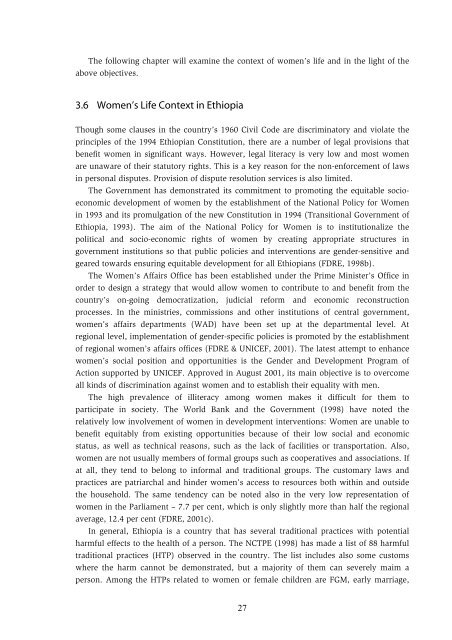

![to read the full report [pdf, Amharic] - Ethiopian Review](https://img.yumpu.com/52737829/1/190x245/to-read-the-full-report-pdf-amharic-ethiopian-review.jpg?quality=85)
